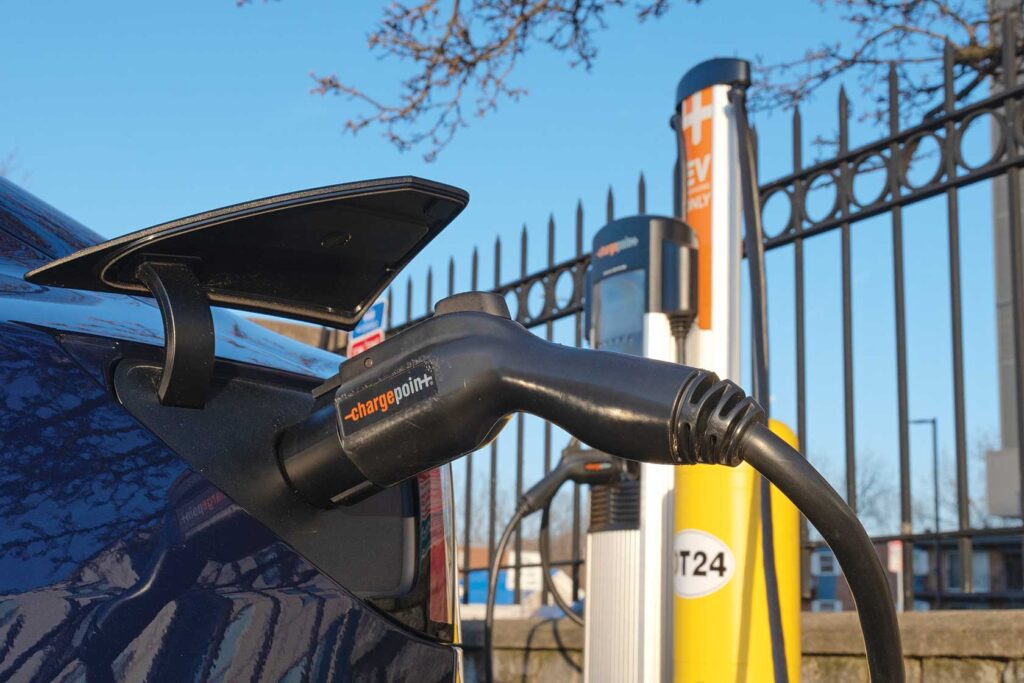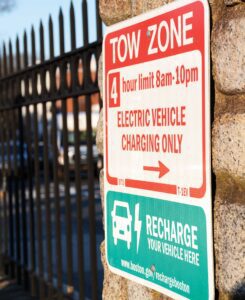
Massachusetts state officials are touting programs that they say will help people of all income levels access bigger-ticket climate actions in a new campaign launched this month.
The campaign, from the state’s Energy and Environmental Affairs Department, advertises things like buying electric vehicles, weatherizing a home, installing heat pumps and using solar power as solutions individuals can pursue to take individual climate action.
Katherine Antos, Massachusetts’ undersecretary of decarbonization & resilience, said the campaign is intended to bring those solutions, and programs the state offers to help make them more financially accessible, to more residents of the state, something that will have to happen for Massachusetts to reach its emissions goals.
“We are never going to be able to meet our climate goals in Massachusetts if we focus on meeting the needs of only our market-rate customers,” she said. “The number of electric vehicles we have on the road; the amount we want to encourage people when they’re moving around to look at other options such as bicycles, e-bikes, public transit; electrifying the homes where they live — that is something we need not just market-rate customers to be thinking about, but all residents.”

A sign marks an electric vehicle charging station at a municipal lot off
Mattapan Square. BANNER PHOTO
Antos touted changes in the state’s electric vehicle rebate program, which was amended last summer to include used vehicles and to allow drivers to apply the rebate on the purchase of an electric vehicle when they buy it, rather than waiting the 90 days it formerly took the program to send out the check. Those changes also added an additional $1,500 rebate for income-eligible residents in the state.
The state also runs Mass Save, in cooperation with utility companies across the state. That program offers free assessments of home energy usage as well as guidance for how to electrify a home and move away from fossil fuels while taking advantage of rebates and other financial incentives.
The 2008 legislation that created Mass Save also created pathways for organizations like ABCD in the Boston area to support low-income residents in providing services focused on energy efficiency.
Through its Climate Equity and Impact Department, ABCD provides no-cost work to weatherize and install air-source heat pumps for households that make 60% or below of the state median income.
Switching from propane and oil — what James Collins, who leads the Climate Equity and Impact Department, called “delivered fuels” — to an electric air source heat pump can save costs and make a more comfortable living environment while also taking climate action, he said.
“It is accessible and … what they may think is a barrier, we’ve thought through in the program design to ensure that we can bring folks through,” he said.
The picture gets fuzzier for residents switching from a gas heating system. Monthly electricity costs are currently often higher than gas costs, reducing or eliminating any savings that might come from the switch in heating source.
Collins said ABCD is involved in work on the policy side to adjust rates, but that process can take time.
“We’re advocating really for whatever is going to help reduce overall customers’ energy bills, but in particular, knowing that this imperative is in front of us for heat pumps, trying to deal with that electric rate,” he said.
Renters, too, are not left out by the heat pump program. If half or more of residents in a multifamily building meet the income threshold, ABCD will do the work of weatherizing and installation of heat pumps.
The work requires sign-off from the landlord, but Collins said that except in the occasional situation where the landlord and tenant really don’t get along, he tends to see a general recognition that the cost and comfort benefits the retrofit can bring are worth it across the board.
The campaign has other options for renters too, like community solar programs, where tenants or other residents who can’t install solar panels on their own roof can pay for a subscription for solar energy generated or purchase panels in a solar farm that provide credits every month on their electric bill.
Antos said, generally, the state encourages renters to talk with their landlords if they’re looking to take climate actions around a house, and that appliances and other items renters can purchase themselves might still be covered under other programs.
“If it’s more efficient, if it’s electric, then they can qualify to get these improvements as well,” she said.
In the next few months, Antos said, the state aims to expand the campaign, with more signage and billboards and a future phase that will be targeted specifically at environmental justice communities.
“We know that there are particular customers who, to date, have not participated as strongly as we would like in these programs,” Antos said. “That is something the Healey-Driscoll administration is laser-focused on — How do we do the engagement? How do we provide the assistance?”






